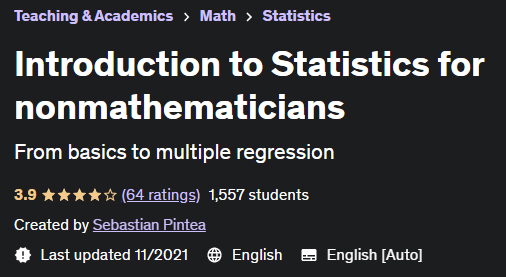Description
Introduction to Statistics for nonmathematicians is an introductory course on statistics for nonmathematicians published by Udemy Academy. From Basic Principles to Multiple Regression. In this course, with the basic concepts of statistics (quantity, variables and constants, samples and populations, randomness and representation, parameters and statistics, units of analysis, databases), measurement scales (nominal, ordinal, interval and scale) ratio) and types of variables (continuous and discrete, parametric and non-parametric), how to convert one type of scale to another, basic description of data (mean, median, mode, range, variance, standard deviation). Theoretical and real distributions, standardization (Z scores), normal distribution and its characteristics, hypothesis testing, null hypothesis probability, Z test, t test and t distribution, confidence intervals, independent samples t test, t test of measurements repeated measures, analysis of variance (ANOVA) for independent samples and repeated measures, Pearson correlation, simple and multiple linear regression.
In all presentations, the focus shifts from the mathematical aspects to the fundamental principles behind each statistical method, so that each topic is very easy to understand. The rhythm of the presentation is well calibrated to facilitate the understanding of each new concept. Each section is followed by several exercises in which you can consolidate your newly acquired knowledge. In addition, for each section you will receive tables with critical values for your statistical indicators and a document with all the solved exercises to check if you are doing it right. Good luck on your way to becoming an expert in statistics!
What you will learn in the Introduction to Statistics for nonmathematicians course:
- Understanding and correct use of the basic concepts of statistics
- To perform a descriptive analysis of the data
- Estimation of statistical parameters in society
- To make comparisons between two or more groups using t-test and ANOVA
- To perform comparisons between two or more sets of repeated measures using t-test and ANOVA
- To understand and perform data correlation analysis
- Building simple and multiple prediction models using linear regression
Who is this course suitable for:
- Students in various fields such as psychology, sociology, business, data science, economics, marketing, anthropology, medicine, engineering, etc.
- Future marketing analysts, business intelligence analysts, data analysts or data scientists
- Professionals in various fields who want to acquire new competencies that will take them to the top level in their profession.
- Entrepreneurs and managers who want to improve their ability to interpret data so that risks and opportunities become more apparent.
Course details
- Publisher: Yudmi
- teacher: Sebastian Pintea
- English language
- Education level: introductory
- Number of courses: 39
- Training duration: 4 hours and 3 minutes
Course headings
Course prerequisites
No specific experience needed
Basic knowledge of arithmetic operations
Pictures

Course introduction video
Installation guide
After Extract, view with your favorite Player.
English subtitle
Quality: 720p
download link
Password file(s): www.downloadly.ir
Size
1.65 GB